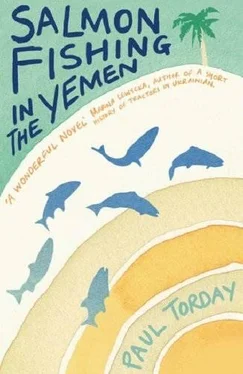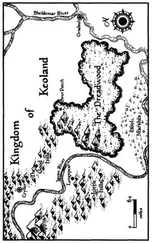It is accepted that the Yemen is, in many respects, not the ideal environment into which to introduce migratory fish whose natural breeding habitat is the northern edge of the temperate zone and whose feeding grounds are in the North Atlantic. Some obvious problems include:
Watercourses go from dry to spate conditions for relatively short periods of time and then only in the wet summer months in those parts of the Yemen which experience monsoon weather.
Mean average air temperatures indicate that water temperatures are likely to be significantly higher than those tolerated by the species Salmo salar without developing stress.
The migratory journey of the salmon, assuming the upper watercourse could be seeded with juvenile fish in the wet season, would be somewhat more challenging than its normal journey to the North Atlantic, being several thousand miles longer and involving a journey around the Cape of Good Hope and up the west coast of Africa before entering waters where salmon are normally found. The previous southern limit of the Atlantic salmon is the Bay of Biscay, and the southern limit of the northern Pacific salmon is northern California.
Once the rains end in September conditions in the watercourses would become dry and hot and it is unlikely any salmon still resident in the system would survive.
There are a number of other issues more technical in nature relating to the local ecosystem, lack of invertebrate life in the wadis (although there is an abundance of arthropods such as scorpions), bacterial issues, and the unknown question of predation. We speculate that buzzards, vultures and other local predators would quickly adapt to eating salmon stranded in relatively shallow water.
We have considered various closed-system models and our current proposals, based on desktop research only, are as follows:
Salmon from the North Sea would be trapped as they tried to enter their ‘home’ river and introduced into a cooled transport pod containing saline water from the North Sea. A condensation and recycling system would be installed to minimise evaporation losses. Means of controlling temperature and oxygen levels within the tank would also have to be found. The pod would be shipped by airfreight to the Yemen. The holding tank would be set up to have an outlet into the wadi which could be opened at need.
As fresh rainwater came into the wadi system, the outlet would be opened allowing it to flow into the holding tank. Salmon are anadromous-they adapt to both salt- and freshwater environments. We speculate that the salmon, on smelling the freshwater, would leave the saline environment and seek to migrate upstream to find spawning grounds. Although the salmon would not recognise the ‘smell’ of the water (the mechanism by which salmon at sea identify the estuarine water of the river in which they were hatched is still poorly understood) we believe there is a reasonable chance they would enter the freshwater. ‘Strangers’ are often found in English and Scottish rivers-salmon which have entered another river different to the one where they were spawned.
The upstream migration would depend on some civil engineering of the watercourse, subject to survey:
a.) to ensure that gradients and natural obstacles did not obstruct the movement of the fish along at least 10 kilometres of riverbed, regarded as the minimum distance suitable for a meaningful pilot experiment
b.) to ensure if possible some background level of flow from the aquifer to achieve a minimum level of water in the watercourse to avoid fish being stranded between spates
We understand that in the Wadi Aleyn there is an existing falaj system of stone conduits to allow the irrigation of a number of date palm groves which could be adapted for the purposes of the above.
Salmon seek gravel beds covered in relatively thin layers of well-oxygenated water for spawning. We understand there is an abundance of gravel in the Yemen, and in the Wadi Aleyn in particular. It is at least theoretically possible that fish could be encouraged to spawn, as we would be introducing summer⁄autumn-run salmon into the watercourse and they would be seeking to spawn at the end of their upstream journey if the right habitat presented itself. This gives rise to the exciting possibility that the introduced salmon could spawn naturally, or at least be electrofished and harvested for their eggs, either of which would allow a hatchery to be set up adjacent to the Wadi Aleyn in which the next generation of juvenile salmon would have an excellent chance of survival. This would create a generation of salmon whose true home was the Wadi Aleyn. How their migratory instincts could subsequently be managed must be a matter for further research. We speculate that the creation of a second holding tank filled with saltwater could be used to trick salmon returning downriver into thinking they smelled seawater, and trap and hold them in a saltwater environment.
At this stage we have not attempted to cost this project until the client has had a chance to consider and comment on the outline concept we have presented. We estimate that, excluding NCFE time and project management charges, the capital costs of this project would be in the region of £5 million. We have not yet considered operating costs. We await the client’s further instructions.
Letter
Fitzharris & Price
Land Agents & Consultants
St James’s Street
London
Dr Alfred Jones
National Centre for Fisheries Excellence
Department for Environment, Food and Rural Affairs
Smith Square
London
6 July
Dear Dr Jones,
Thank you for the project proposal, which was received here on 2.9 June. Our client, who is at present in the UK, has now had an opportunity to consider the document and wishes to discuss the matter with you in person. I may say that he was extremely positive about the professional and constructive manner in which you have addressed the brief.
Please would you be kind enough to sign the attached confidentiality agreement, to allow us to disclose further information to you regarding our client and the project. Once
I have received the signed copy I will then be in touch with you regarding a further meeting.
Yours sincerely,
( Ms) Harriet Chetwode-Talbot
Email
From:
Fred.jones@ncfe.gov.uk
Date:
7 July
To:
Mary.jones@interfinance.org
Subject:
Yemen⁄salmon
I thought you would like to know that relations between myself and David Sugden are once again amicable. I have submitted an outline feasibility proposal on the Yemen salmon project to Fitzharris & Price. I have received a very warm and, frankly, enthusiastic response. I met David Sugden by the coffee machine today (by accident? he sort of turned up while I was dialling in a cappuccino, so he had one too and we chatted for a bit). He said, as far as I can remember, ‘We were all pretty impressed by that paper you put up to Fitzharris & Price. Visionary stuff. This could be a very high-profile project in due course.’
I mumbled something, you know I can’t stand flattery, and asked if it was OK to sign the confidentiality agreement before we go any further. He said yes, and actually patted me on the shoulder. He’s not a very tactile person and that was really quite demonstrative for him.
The thing is, if I’d just rolled over for David when he first asked me to get involved in the project, he would just have taken my work for granted and not considered it anything special. Because I made a bit of a fuss-in order to test his own commitment to such an unusual project-he now thinks he has won a great battle and is one hell of a good manager. The reality is that if one knows how to handle these apparatchiks you can get them to eat out of your hand. Hope all is going well in Geneva, and that you will be home soon. Missing you.
Читать дальше












